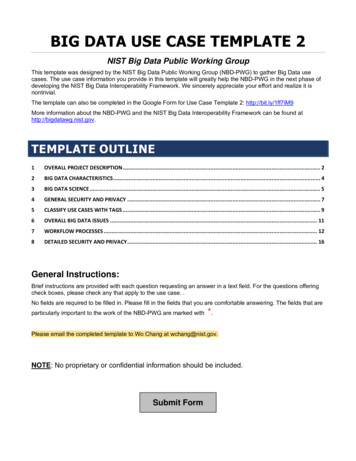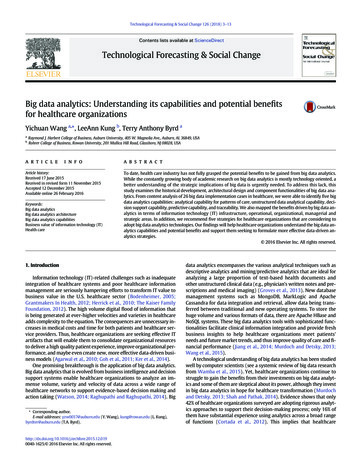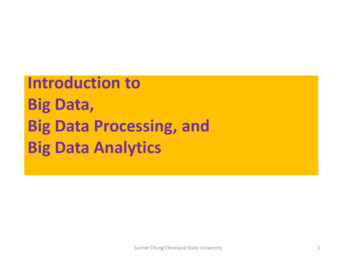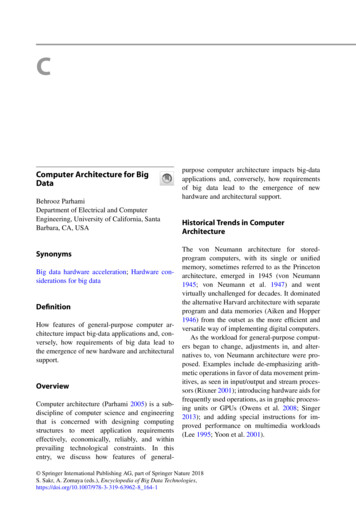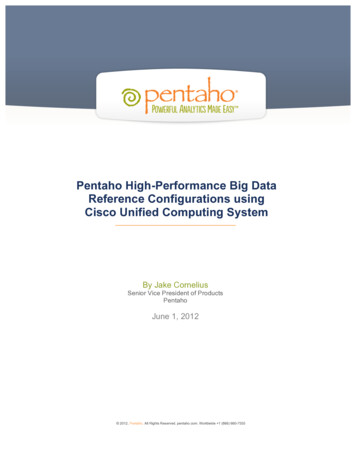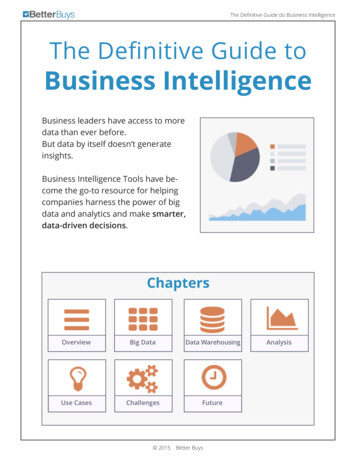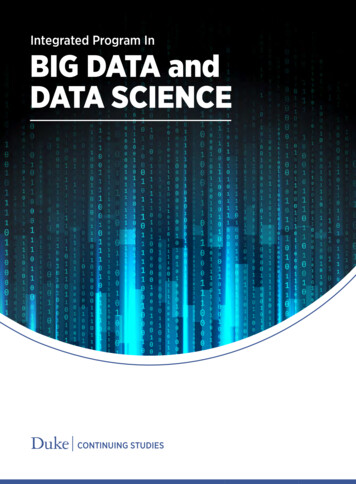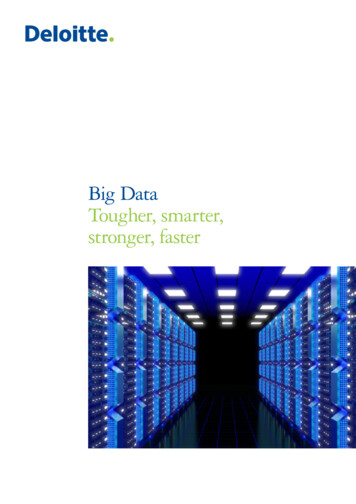
Transcription
Big DataTougher, smarter,stronger, faster
ContentsForeword1Tougher regulation, policy and cost control2Smarter technology solutions4Stronger community engagement5Faster opportunities ahead6Summary7Contact us8References9This report has been co-authored by Justin Cheng, Chris Lewin, Tim Nugent,Rob Hillard (Enterprise Information Management, Deloitte Australia)
ForewordThe business case for Big Data analytics is improving,despite public and private companies discovering datamanagement weaknesses, uncovering skills gaps andencountering tough new regulatory challengesWhere are we now?Last year, we identified Big Data analytics as one of thekey technology trends to watch1. It certainly has beenhard to ignore. Yet for all the attention, local successstories are still few and far between.So why are Australian businesses finding it so hard tocreate value amid the hype?Our experience reveals that the reasons may be morestructural than strategic. The resilience of the Australianeconomy has dampened pressure on local businessesto dig deeper for insights and to invest in more datadriven processes. At the same time, companies havebecome more cost-conscious, anticipating a reversal ofour recent fortunes. Industry is becoming more wary ofinvestments in new and unproven technologies.The business case for Big Data analytics has sufferedmore than most. Almost certainly because its benefithas only been articulated as better insight profferedwith trust that better insight translates to businessvalue. In reality, businesses have thus far struggledto prove a definitive link between investments in BigData systems and financial performance2.Here’s the rub - things are about to change in Australia.As our economy rebalances and restructures andcompetitive pressures intensify, it is vital for all industryand government leaders to ask more searchingquestions about strategy, markets, customers andoperations3.The business case for Big Data analytics is about toreturn to the investment agenda in a very big way.Until now, a laggard approach to Big Data has been amixed blessing. Technology shifts have left first moverswith write downs on their early investments. Firms thathave pushed the boundaries on personal data use andretention have found themselves increasingly under theburden of government scrutiny.But as the tools mature, experience proliferates andaccepted practices emerge, risks to adoption forindividual firms will diminish. This can tip the balancefor Big Data projects, particularly in cases wherethe business benefits are clear and quantifiable ahead ofimplementation.The immediate focus for firms should be to invest indata management capabilities and to build data talent.These critical success factors have too easily beenshelved alongside fledgling Big Data projects.Investments in better data management and talentdevelopment offer a far better return than pickingwinning products. Not only is strong data managementa necessary condition for success with any new dataventure, but it is also transferable across point-in-timetechnologies. And while Big Data analytics continuesto hold great potential, it is unlikely to yield anysolutions that will reduce our dependence on humanmanipulation, insight and experience.Big Data Tougher, smarter, stronger, faster1
Tougher regulation, policy and cost controlFor all companies interested in Big Data, it pays to beacross new challenges appearing on the horizon. We’veidentified three key areas that we think will pose thebiggest hurdlesGovernment Regulation and PrivacyAs firms strive to retain more data and share it morewidely, they continue to be confronted by legislationand regulation. The Australian Government’s own‘Big Data Strategy’4 released last year, identified thirteenlegislative and policy controls which it had to consider.Much of this regulation was drafted more than 20 yearsago and can hardly be expected to keep pace with therequirements of modern corporate data use.Yet the legislation cannot be ignored. From March 2014,the Australian Privacy Principles (APPs)5 will replacethe National Privacy Principles and Information PrivacyPrinciples. This change will broaden the powers of theOffice of the Australian Information Commissioner(OAIC) to investigate and publicise privacy breaches,including civil penalties of 340,000 for individuals and 1.7 million for businesses6.Increased regulation will pose bigger barriers toadoption of Big Data analytics in some industries morethan others – particularly those that are required tohold and process sensitive customer information aspart of everyday operations. Conversely, industries suchas mining, where data is typically sensor-based andrarely contains private customer details, will be freer toexplore the Big Data opportunity.2
Corporate Data PolicyFirms are recognising that they need a centralised policyapproach to extract value from data – big or otherwise.In response to increasingly complex data handlingrequirements across the organisation, Chief Data Officer(CDO) powers and responsibilities have become moreprevalent in the executive suite.Although data processing tools are still predominantlyseen at the business unit level, larger organisations havebegun forming parent data committees at the grouplevel. For example, the Australian Government hasadopted a whole-of-government approach to Big Data,establishing a multi-agency working group and a DataAnalytics Centre of Excellence (DACoE) to focus on thedevelopment of capabilities.CostIn most cases, the cost of Big Data analytics is muchclearer than its benefits. And although the entryprice for systems continues to drop, Big Data assetdepreciation is still driven by obsolescence, notproductive output. The faster the technology moves,the more costly it appears on financial statements.Big Data technology continues to evolve faster thanmost.Big Data can also require investment in expansive,power-hungry infrastructure. At a time that datacentre managers are trying to reduce energy footprints,Big Data distributed architectures are demanding evermore expansive physical processing power.A more centralised approach to governing data willpose new challenges for business units and agencieswhich crave autonomy and responsiveness. Data policycentralisation is of course well-intentioned (a typicalfocus being simply to improve the quality and availabilityof information). But where does business dataownership stop and corporate data ownership begin?Can corporate data control be effective withoutimpeding front-line decision making? Such crunchyquestions will only become more challenging as newand valuable data sources are discovered in all parts ofthe organisation.Big Data Tougher, smarter, stronger, faster3
Smarter technology solutionsThe challenges are real, but Big Data products arecountering these forces in new and innovative waysIn response to excess demand for software developersexperienced with new Big Data programmingparadigms such as Map-Reduce, technology vendorsare choosing to build bridges to more traditional totraditional tools, like SQL and R. This convergencereduces barriers to adoption, especially the burdenof reskilling employees and hiring specialised labour.Competitive forces are driving vendors to take thesebarriers lower still. With Big Data technology beingcommoditised faster than usual (in part due to basetechnologies like Hadoop being open source) vendorsare no longer shielded from competition by theirintellectual property alone.Product suppliers are being forced to reposition anddifferentiate their offerings through leaner integrationwith existing technologies and by helping develop datatalent with better training.4Managed Big Data solutions are offering an attractivealternative to owning physical systems. The necessaryinfrastructure can now be leased for as little as adollar a day. Multiply these savings by the reduction indeployment and maintenance costs and the financialsdramatically improve. Organisations increasingly want tolook at options with Big Data solutions as an operatingexpense, reducing capital investment.The cloud model presents its own unique challenges,however. Storing and processing confidential datasetson third party platforms creates a shared responsibilitybetween customers and providers - but organisationsshould make no mistake as to which party is ultimatelyaccountable. Processing data across borders canalso give rise to complex multi-jurisdictional issues.Companies must ensure robust data governancecontrols are in place before migrating to the cloud.
Stronger community engagementThe technology community continues to be captivatedby the Big Data opportunitySelf-organised user groups are growing rapidly andhave started attracting the attention of large industryvendors. One such group in Melbourne experienced13% growth in attendance per meeting last year, andnow boasts more than 700 total registered members.This community plays a significant role in filling theskills gap left by under-investment in data managementcapabilities. It brings together practitioners fromdifferent (and sometimes disconnected) disciplines tocreate a rich network for self-learning and knowledgeexchange.Without this type of open engagement, Australianindustry risks an encounter with critical shortages indata skills. Australian universities are doing their part,but simply do not have the resources to meet the scaleof the problem. Every company that is serious aboutusing Big Data needs a plan to develop and accessexternal data talent.For businesses, there is untapped potential in thiscommunity beyond a source of recruitment. Byproviding the right resources, goals and incentives,communities can be directed to solve real businessproblems. For example, GovHack, a competitionwhich challenges participants to create meaningfulvisualisations from freely available government data,highlights the breadth of opportunity.Big Data Tougher, smarter, stronger, faster5
Faster opportunities aheadThe business case for real-time operational insight iseasy to make when minutes of downtime equate tomillions in lossesLeading the local charge with Big Data will be theAustralian mining industry. With the industry shiftfrom investment to production, there is renewed driveto work existing assets even harder. Better operationalintelligence and real time analytics will be fundamentalto managing operational risks and streamliningmining processes including remote and autonomousoperations.Along with other data-intensive industries (such astelecommunications, health and financial services),mining has already tackled important parts of theBig Data analytics problem. For example, Australianmining companies are already comfortably in control ofhuge volumes of data within their enterprise historiandatabases. And unlike our besieged retailers, they won’tneed to learn how to interpret hoards of external,unstructured data such as social media sentiment toextract valuable insights.With volume and variety tamed, the mining industry hasone standout Big Data challenge: velocity. Mining willneed to build ‘speed of thought’ analytical capabilitiesto be able to preserve precious production uptime,while pushing operations to the frontier of efficiency.The business case for real-time operational insight iseasy to make when minutes of downtime equate tomillions in losses.There is still much ground to cover. But mining canbenefit from progress made by other industries,particularly investment banking. Such banks arenotoriously intolerant of downtime. They faceequally punitive consequences for operational failures.In response, they have pioneered the use of real-timearchitectures, such as Complex Event Processing (CEP),which help them achieve sub-second responses to atorrent of data inputs. Behind the responses sit complexpredictive models, which optimise decision makingusing algorithms and mathematics.The market for real-time intelligence has quietly beenexperiencing double digit growth. CEP products havealso been joined by newer, faster, in-memory solutionsand high performance architectures. For example,Cloudera released Impala last year which claims a50-68x performance improvement over open sourceimplementations of Hadoop. Such drastic advancesshould capture the attention of any industry whereprofits are measured in minutes and seconds.For industries whose success depends more oncustomer insights than operational intelligence, it paysto maintain a sense of opportunity with Big Data.The data undoubtedly holds valuable clues to increasingshare of wallet, optimising pricing and driving lifetimecustomer value. The need to unlock these insights isbecoming more pressing too, as consumer preferencescontinue to shift and disruptive business modelsemerge.However, when building a business case for Big Datacustomer intelligence, it is important to discount thepotential benefits of any game-changing insight by theprobability of actually finding it. This depends on manyfactors – among them data quality and availability ofanalytical talent.6
SummaryIn the past year, Big Data has become tougher, smarter,stronger and faster. Greater regulation and increasedfinancial penalties for mishandling data has made thebusiness case tougher to prove for many industries.The immediate focus for companies with Big Dataaspirations should continue to be building a strong datamanagement capability and collaborating more closelywith the external data community.But the technology is getting smarter. And it isincreasingly supported by a stronger, more connectedcommunity which plays an important role in fillingthe gaps arising from under-investment in datamanagement skills.All of industry stands to gain enormously from a morecoordinated approach to building the next phase of our(big) data-driven economy.The Australian mining industry can demonstrate thebusiness case for Big Data, but it is only a matter of timebefore the Australian economy shifts more broadly todata-driven decision making processes, unlocking a newgeneration of business intelligence.Big Data Tougher, smarter, stronger, faster7
Contact usTim NugentNational Lead PartnerEnterprise information managementTel: 61 3 9671 6153tnugent@deloitte.com.auRobert HillardManaging PartnerTechnology AgendaTel: 61 3 9671 7971rhillard@deloitte.com.au8
References1. See Deloitte (2013), ‘Tech Trends 2013 – Elements of postdigital’2. In one sample we took, 71% of respondents did not use customer analytics, citing cost and proven value as thebiggest barriers3. See the latest instalment in our ‘Building the Lucky Country’ series, ‘Positioning for prosperity?Catching the next wave’.4. Australian Government Information Management Office (AGIMO), Department of Finance and Deregulation,‘The Australian Public Service Big Data Strategy’, Aug 20135. Office of the Australian Information Commissioner, ‘Information Privacy Principles’6. Timothy Pilgrim, ‘Privacy Awareness Week 2013 Privacy Commissioner’s Update’, 29 April 2013Big Data Tougher, smarter, stronger, faster9
General Information OnlyThis publication contains general information only, and none of Deloitte Touche Tohmatsu Limited,its member firms, or their related entities (collectively the “Deloitte Network”) is, by means of thispublication, rendering professional advice or services.Before making any decision or taking any action that may affect your finances or your business, youshould consult a qualified professional adviser. No entity in the Deloitte Network shall be responsible forany loss whatsoever sustained by any person who relies on this publication.About DeloitteDeloitte refers to one or more of Deloitte Touche Tohmatsu Limited, a UK private company limited byguarantee, and its network of member firms, each of which is a legally separate and independent entity.Please see www.deloitte.com/au/about for a detailed description of the legal structure of DeloitteTouche Tohmatsu Limited and its member firms.Deloitte provides audit, tax, consulting, and financial advisory services to public and private clientsspanning multiple industries. With a globally connected network of member firms in more than 150countries, Deloitte brings world-class capabilities and high-quality service to clients, delivering theinsights they need to address their most complex business challenges. Deloitte has in the region of200,000 professionals, all committed to becoming the standard of excellence.About Deloitte AustraliaIn Australia, the member firm is the Australian partnership of Deloitte Touche Tohmatsu. As one ofAustralia’s leading professional services firms, Deloitte Touche Tohmatsu and its affiliates provide audit,tax, consulting, and financial advisory services through approximately 6,000 people across the country.Focused on the creation of value and growth, and known as an employer of choice for innovative humanresources programs, we are dedicated to helping our clients and our people excel. For more information,please visit Deloitte’s web site at www.deloitte.com.au.Liability limited by a scheme approved under Professional Standards Legislation.Member of Deloitte Touche Tohmatsu Limited 2014 Deloitte Touche Tohmatsu.MCBD HYD 01/14 01602
Big Data Tougher, smarter, stronger, faster 1 Foreword The business case for Big Data analytics is improving, despite public and private companies discoveri

